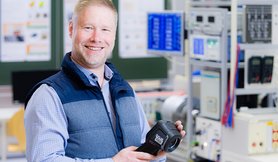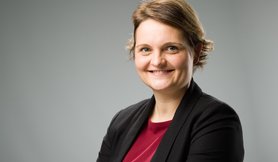![[Translate to English:] Sören Miersch](/fileadmin/HTW/Forschung/3_Service/4_Service_fuer_Graduierte/Postdoc-Programm/20220425_SMiersch-066.jpg)
"I want to convey enthusiasm for the field of electrical engineering."
Dr.-Ing. Sören Miersch starts in the postdoc program at HTW Dresden.
Since May, Dr. Sören Miersch has been part of the Electrical Machines and Drives research group at the Faculty of Electrical Engineering. As part of the postdoc program, the scientist will expand his expertise in research and teaching in the coming years to prepare for a future career in higher education. He will be supported by his mentor Professor Thomas Schuhmann.
Mr. Miersch, what topics will you be working on as a postdoc in the coming years?
Topics such as electromobility, regenerative energy generation and sustainability in terms of manufacturing and recycling are among the focal points of future development work in the field of electric drive systems. In this respect, I see great potential in the area of materials research. For example, the research group Electrical Machines and Drives at HTW Dresden, in cooperation with the Fraunhofer Institute for Ceramic Technologies and Systems IKTS, is investigating new types of insulating materials. Using these insulation materials, we have already been able to experimentally demonstrate increases in power density of up to 45%. Based on this excellent result, I intend to initiate several new research projects. Thus, the ability to obtain third-party funding and the reputation of the Faculty of Electrical Engineering and especially the research group Electrical Machines and Drives shall be strengthened. In addition to my research activities, I plan to introduce a new course on heating calculations and cooling methods for electrical engineering applications. I hope to generate interest with students in the higher semesters. I myself want to expand my experiences in the area of teaching.
What did you do before your postdoctoral work at HTW Dresden?
Before starting my electrical engineering studies at HTW Dresden, I completed a vocational training as an electrician. Afterwards, I worked at Robert Bosch Power Tools GmbH. I already decided to study at HTW Dresden during my vocational training and Bosch always provided me with great support during this phase of my life. For example, I was able to gain further experience as a working student during the practical semester and during the semester breaks and earn some extra money during my studies. Already during my master studies I started to work as a research assistant at the Faculty of Electrical Engineering, where I continued to do research after my graduation. I worked on several research projects on the topic of cooling electrical machines. Other focal points were the investigation of small wind turbines and high-speed drives, such as those increasingly used for axle drives in electric vehicles. The results of these projects formed the basis for my dissertation on the topic: "Increasing the utilization of permanent magnet excited external rotor machines by improving heat dissipation", which I defended at the TU Dresden at the end of 2021.
How did you become a "scientist"?
By not being able to fully answer burning questions - for example, about the thermal design of a small wind turbine generator - within the time frame of my thesis. However, within the framework of a research project, I had the opportunity to continue my research on this topic as a research assistant at the HTW Dresden.
What makes the work of a scientist appeal to you?
The calculation of the heating behavior of electrical machines is a multidisciplinary issue. Comprehensive knowledge in the field of electrical engineering as well as the subjects of thermodynamics and fluid mechanics is required. At the HTW Dresden I found the necessary interdisciplinary research environment to pursue this question. Furthermore, the research projects at HTW Dresden have a high practical relevance. You are constantly in contact with industry partners, visit trade fairs and publish your research results at national and international conferences. Especially in the area of networking, I was able to learn a lot more during my time as a research assistant.
You have been at the HTW Dresden for quite some time. What makes the HTW a special place for you?
I particularly like the interdisciplinary cooperation and the practical research, which includes cooperation with industrial partners and other research institutions. I also find the participation of students, who work on the research projects as part of their theses, very enriching.
What would you like to achieve as a postdoc?
In the context of the postdoc activity, I plan to apply for and establish an innovation network. In the long term, this should contribute to strengthening networking with industrial partners and thus to accelerating research activities in the field of electrical machines and drives.
In addition, I would like to support the Faculty of Electrical Engineering in attracting new students.
The focus here will be on introducing the career field of an electrical engineer to technical high schools and grammar schools. We need to inspire more young people to study electrical engineering, as this is the only way to meet the great demand on the labor market in the future. Questions that concern us all, such as regenerative energy generation and transmission, are primarily to be answered by electrical engineers.
We wish you a successful time as postdoc at HTW Dresden!
The Postdoc Program at HTW Dresden
With the Postdoc Program, HTW Dresden supports highly talented young scientists who have completed their doctorate. The goal is to attract them to research and teaching and to qualify them for a professorship or permanent scientific position at a university of applied sciences (HAW). Within five years, postdocs go through two qualification phases that include aspects of teaching and research as well as personal development. Successful graduates receive the "HAW-Postdocplus" certificate. Currently, there are six postdocs at HTW Dresden.
Weitere Dokumente/ Antragsformulare finden Sie hier: https://www.htw-dresden.de/en/hochschule/aktuelles/translate-to-english-news



